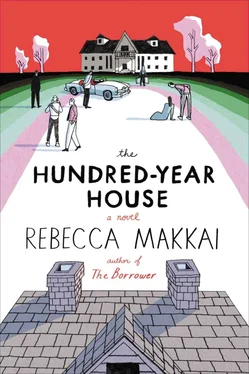The scene brought to mind the only card she remembered from her tarot reading with George in the Marais. The others had all looked like playing cards, silly queens and princes, but then the old woman had flipped up the five of pentacles, and Grace had felt she’d seen the picture before, or maybe lived it: two beggars in the cold, outside the warm church. Locked out. She couldn’t remember the woman’s explanation for the card, but she knew she’d felt it in her bones. And she felt the same thing right now, watching Max. She was only a visitor at Laurelfield.
She remembered George’s tarot better, only because it had seemed to trouble the old woman. As if it had revealed his problematic soul. She’d muttered her way through most of it, while Grace did her best to translate. George had wanted to know about the tower card, which looked terrifying: a turret struck by lightning, two naked figures jumping from the windows. The woman said, “ C’est pas si grave. C’est la change, seulement, la change soudaine.” And then, as if this were just as important, the woman had explained that in the old Belgian decks, the tower had been a tree. “What’s she saying?” George demanded. And Grace said, “It means don’t go outside when it’s raining.”
Now she chose one of the tart green apples from her sill, one of the five she’d picked that morning from the trees behind the Longhouse (three adjoined artists’ studios, inhabited now by raccoons), and ate slowly around the core. All the windows were open, no screens. She’d pulled those out so birds could fly through, though her only guests had been some skittish barn swallows who hadn’t even made nests under the gable eaves as she’d hoped. She started to throw the core onto the driveway, but changed her mind and crossed the broad, loud floor to the back of the house. There were George and little Amy, near the yellowing catalpa tree. There was something odd in the way they stood — the very fact of their standing together, to begin with, but moreover the way he curved above her like a cobra — so that it wasn’t even a surprise when George grabbed one of Amy’s wrists and pinned it above her head, against the bark of the tree. Grace grabbed her birdwatchers. She held the last bite of apple in her mouth like Snow White, not chewing or spitting or choking, just watching as George undid the top buttons of Amy’s dress and yanked it down below her left breast, and her brassiere with it, so that Grace could see the pink nipple even from here. Amy’s leg rose as if she were trying to kick him away but didn’t know to aim for the groin. George lowered his head to Amy’s breast and, since he was in profile to her, Grace could see even his tongue, circling the breast and then climbing slowly up Amy’s neck. Amy pushed him away and tugged her dress back up, but she didn’t run or scream, and that was what counted, wasn’t it?
Well.
Well.
Grace, good literature major that she was, told herself this apple was a symbol of lost innocence, and that now, with the sweet pulp in her mouth still undissolved, would be the perfect time to feel shock and repulsion. And was it a failure on her part that she felt neither? Not shock, because she wasn’t an idiot. And not true repulsion, either, not in the way she ought. This was the man she’d chosen. This was the reason she’d broken things off with Gunning Burke and Stanley Langhoff and Lionel: because they weren’t the kinds of men to do anything surprising or awful or awakening. They smothered her with their patience, and she’d felt locked in a windowless, velvety room with the smell of peppermint and nowhere to vomit.
Well.
This was not the second strange thing. Because really it was not so strange.
The figures below had parted, Amy trotting across the lawn to the kitchen door. Grace supposed she was heading in there just to burn the soup. Ever since she’d shown up the food was markedly worse, and Grace suspected Rosamund was trying to teach her things, letting her chop and make salad dressings. Poor, stupid Amy, probably in love with George and not able to understand that a year from now he wouldn’t recall her name.
Grace was the only kind of woman George could ever have married, just as George was the man she’d waited twenty-eight years for, through parties and debutante balls and engagements and what everyone saw as spinsterhood. And then at the Governor’s Ball in ’53, up had walked George Grant, a pimentoed olive in his teeth, eyes like the Big Bad Wolf. He bit down so the olive split, half in his mouth, half tumbling to his palm. He walked a step closer and, right in front of Grace’s father, jammed the olive half between her lips. “It’s good for you,” he’d said, and walked on to scoop his arm around the slim waist of the mayor’s daughter.
Her mother, scurrying up: “Who was that ?”
And Grace, quite drunk and melodramatic already that evening, had swallowed the olive and turned away.
—
A pleasant paralysis set over Grace as the afternoon wore on, and she watched the coach house as Max and the witch continued to talk. Amy reappeared at one point, walked to the big house, returned to the coach house with a pillow and blankets — and yes, there she appeared in the east rooms, opening the window and preparing a bed for the witch. Grace ought to have cared that yet another guest was being welcomed on her property without her consent. Her mother never would have allowed it, would have been horrified at Grace just sitting here, watching Max build a harem in that little house. Some harem: a witch and his niece. Only she wasn’t really his niece. Grace knew.
After a long while, Max and the witch strolled together out of the coach house, behind the big house, and straight into the garden shed. They emerged twenty minutes later, and so did Ludo and Beatrice, the gardeners. Max and the witch walked them to their car and kissed their cheeks before the gardeners drove off, done for the day. The witch took Max’s arm, quite formally, and they disappeared back into the coach house.
The sun was setting, and she ought to head down for dinner before they sent a search party.
Amy reappeared. She was a figurine from a cuckoo clock, circling forever in and out: coach house, big house, coach house, big house. But this time, as she crossed the lawn toward the kitchen door, the earth seemed to move behind her. No, it was rabbits. Grace counted at least seven of them, hopping along behind Amy as if out of Hamelin. She didn’t seem aware in the slightest. And what irony! Seven cottontails, and not a bit of good luck for Amy — sad little, odd little, hungry-eyed Amy, who thought she was desired because George pinned her to a tree. The kind of girl to whom misfortune clung like moss. Grace stood and brushed the attic dust from her lap.
So it was two strange things now, two omens. If she only kept watching, tomorrow and the next day and the next, the third thing would come. And the third was always biggest.
—
She felt the house waking around her in the morning before she herself was fully awake. Windows opening, Ludo’s rhythmic clippers outside, feet in the hall, wheels on the gravel drive. It was the same everywhere she’d ever lived: at home at Bealey Hall, with so many more servants than here, and her brothers shouting, and later her brothers’ children shouting; in the college dormitory, where some girls were always up and running baths at the crack of dawn; in hotels, where someone had been up all night at the desk, where the maids arrived at four in the morning. She wondered what it was like to awaken alone in a little cottage on a quiet street, where nothing would stir until she did. Maybe a sleeping cat at the foot of the bed, and that would be all. But here at Laurelfield, there was something more in the mornings, a buzzing sensation about the whole house, as if it weren’t the servants keeping it running but some other energy. As if the house had roots and leaves and was busy photosynthesizing and sending sap up and down, and the people running through were as insignificant as burrowing beetles.
Читать дальше












